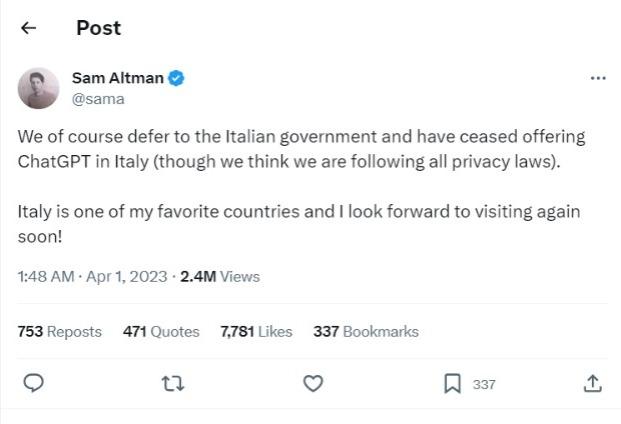ChatGPT is facing backlash everywhere. Ever since the AI language model was introduced, it has faced a series of criticisms. Some countries responded with an outright ChatGPT ban, including China, Iran, North Korea, and Russia. However, the new fear is whether more and more countries and corporations will consider this option of banning ChatGPT as a whole.
The fear gained momentum last week when the U.S. Space Force paused the use of generative AI tools, including ChatGpt. This prohibits personnel from using AI tools due to data security concerns. It said the ban was because of data aggregation risks.
Millions of people have used the generative AI tool ChatGpt since it was launched in November 2022. From creating contents to generating ideas, ChatGpt was a blessing in disguise for people who do not have much time to spend brainstorming thoughts and ideas. Bill Gates has called ChatGPT the most revolutionary technology in 40 years.
But they won at what cost? ChatGPT is not all sunshine and roses. Various sources report the misuse of ChatGPT, ranging from issues spanning personal freedom, legality, and national security. Let’s put it in perspective.
Legal Concerns for ChatGPT ban
- Do you know how ChatGPT gets all the money? They sell API services to businesses, offer premium subscription plans, sell training data sets, and provide language processing services. So it is obvious that they follow a data-led revenue model. Now you can infer why Italy banned ChatGPT in the first instance. Additionally, the EU is currently working on the world’s first legislation on AI, which will make times harder for chatbots.
- Samsung has recently banned the use of generative AI tools, including ChatGPT, after their staff accidentally uploaded sensitive code to the platform. After that, many corporations followed the lead to protect their sensitive data from being stolen and to protect their intellectual property rights.
- You can generate any information with a simple prompt from ChatGPT. But what you get from the platform is not plagiarism-free. ChatGPT generates contents just by spinning articles from different online databases, like making a puzzle from nothing. In the future, these types of contents can have legal implication, like copyright infringement.
Privacy
As AI becomes increasingly intertwined with our online interactions, questions about transparency and ethical implications have taken center stage.
- Italy became the first Western country to block ChatGPT in March 2023, citing privacy concerns. Italian regulators cited a March 20 data breach that exposed the conversations and payment details of users. So there are serious concerns growing about how ChatGPT might deceive and manipulate people.

- Further, there is a website extension called Shared GPT where you can actually share the conversations with ChatGPT. It is unclear whether these extensions have an integrated privacy policy in place.
- Additionally, ChatGPT is open, and there is no age bar to access it, unlike Google’s Bard. There is no mechanism to verify the age of users. So there are high chances that minors will be exposed to unsuitable answers for their age. However, Google BARD took it into consideration and allows only 18+ to use the platform.
National Security
Just to give a little more context here, Arizona State University experts say chatbots pose a risk to national security. It could be manifested in any of these ways.
- Disinformation and fake news spread like wildfires. AI chatbots are designed to express themselves fluently and authoritatively. So we tend to believe it, even when it is wrong. An Arizona State University study reveals that this has the potential to affect voter sentiments in the upcoming US elections in 2024.
- Cybersecurity will be at stake when ChatGPT is employed on a large scale. Its ability to generate malicious code could enable attackers to create and deploy new threats faster, outpacing the development of security countermeasures. Another serious national security threat is the use of chatbots to craft phishing emails and messages. This can trick people into revealing sensitive information or installing malware on their devices.
- Economic security is something one should never take for granted. We are all witnessing credit card scams on our daily news channels. That is why Deutsche Bank blocked ChatGPT to ensure the security of their core system and clients’ data.
Closing Up
Humans love to be in their comfort zone. It is natural for us to resist change, whether the change is progressive or degressive. Did you know that teachers wanted to ban calculators in 1988? In a digital world where artificial intelligence and machine learning have become integral components of our daily lives, the ban culture will not yield any positive outcome.
Some speculated that the rapid outreach of ChatGpt had caught the attention of competitors who wanted to stifle its success. Although that might not be the only reason, organizations should reduce personal data when training AI systems and comply with privacy guidelines. In addition, these AI systems need greater public scrutiny, and public authorities must reassert control over them.
So, do you think ChatGPT ban is justified? Let us know in the comments section. This is a developing story. We will update as new information is available.